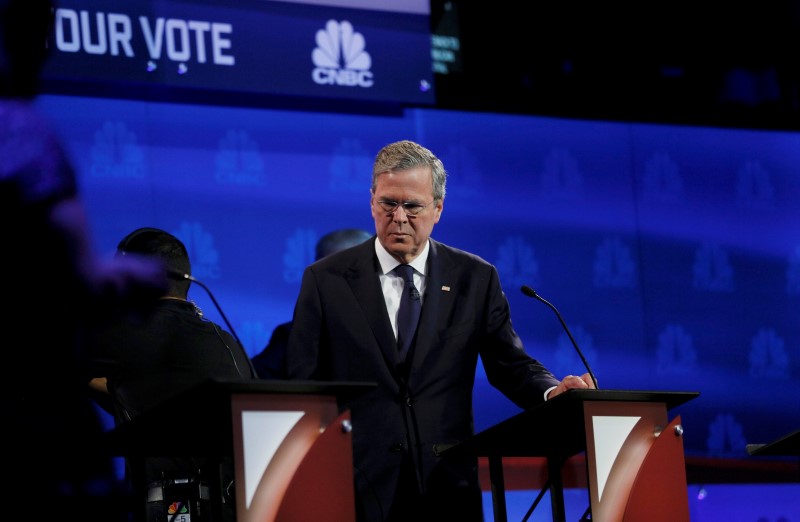By James Oliphant
BOULDER, Colo. (Reuters) - Jeb Bush needed a strong performance at Wednesday night's Republican presidential debate to silence the doubters. He did not get it.
His showing, widely viewed as lackluster, is likely to spur even more questions about his viability as a top-tier candidate, according to political strategists and donors.
"If he was looking to revive his campaign and replenish his coffers, tonight did not do him any justice," said Republican strategist Ford O'Connell.
Bush's campaign manager insisted immediately after the debate that the former Florida governor would remain in the 2016 presidential nomination race for the long haul.
But Bush found himself in the uncomfortable position on Thursday of tacitly acknowledging a poor debate performance while brushing off suggestions his campaign might be doomed.
"I wish I could talk as well as some of the people on the stage, the big personalities on the stage, but I'm a do-er," he said during a campaign stop in Portsmouth, New Hampshire.
In an interview with Fox News, Bush also said, "I knew this was going to be a long journey, but to suggest that the campaign is terminal ... Come on, that's pretty funny."
Bush came into the debate after dramatically downsizing his campaign staff and huddling with nervous donors to calm their fears, the result of persistent single-digit showings in opinion polls.
Those donors are probably even more anxious after Bush seemed to come out on the losing end of exchanges with U.S. Senator Marco Rubio and New Jersey Governor Chris Christie and disappeared from the screen for long stretches of time.
"You have all these donors invested in him," Craig Robinson, the former political director of the Iowa Republican Party, told Reuters after the debate. "At some point, they're going to change horses."
Bush hit fellow Floridian Rubio early with a jab at his attendance record for votes on the Senate floor. But in what became one of the debate's most talked-about moments, Rubio flipped the attack back at him, labeling Bush an opportunist.
The only reason Bush was making it an issue, Rubio said, was "because we're running for the same position, and someone has convinced you that attacking me is going to help you."
Startled, Bush had no response.
"He went at Rubio with a knife," O'Connell said. "Rubio came back with a gun."
Rubio was diplomatic in a sweep of television interviews on Thursday, telling CNN that he thought Bush had been a "great governor."
"I don't believe that the way I'm going to win is by going after him or anybody else," Rubio said.
Late in Wednesday's debate, Bush was asked whether fantasy football should be treated as gambling. He joked about his own fantasy team before suggesting the government should get more involved.
It was a rare moment when Bush got a chance to show his sense of humor and one that otherwise might have gone over well.
But Christie interjected, to the approval of the audience: "Are we really talking about getting government involved in fantasy football? We have - wait a second, we have $19 trillion in debt. We have people out of work. We have ISIS and al Qaeda attacking us. And we're talking about fantasy football?"
Bush, whose diminished standing in the race was noted by the debate moderators, was not a factor for much of the night. Of the 10 candidates on the stage in Boulder, Colorado, for the main debate, the only one who spoke for less time than Bush was another struggling contender, U.S. Senator Rand Paul of Kentucky.
"I think he acquitted himself well, but he didn't dominate," said John "Mac" Stipanovich, a Florida lobbyist and a longtime Bush ally. "The summer soldiers among Jeb's supporters will not be comforted. Those made of sterner stuff will not be discouraged."

Polls have consistently had Bush in the single digits, far behind billionaire developer and reality TV star Donald Trump and retired neurosurgeon Ben Carson. The latest Reuters/Ipsos five-day tracking poll had Trump in the lead with 32 percent, Carson behind at 15.5 percent and Bush at just 7 percent.